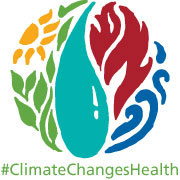
"We tend to blame people who waste food, farm in unsustainable ways or are obese, but we need to understand what is really going on. We need practical solutions, and we also need a broad social commitment to address root causes." -- Roni Neff, PhD, MS, The Johns Hopkins Center for a Livable Future
Climate change is expected to threaten food production, food quality, food prices and distribution systems. Many crop yields are predicted to decline because of the combined effects of change in precipitation, more frequent and severe weather events and increasing competition from weeds and pests on crop plants. Livestock and fish production are also projected to decline. Prices are expected to rise in response to declining food production and such trends as costlier pesticides, fertilizers and the petroleum used for agricultural machinery and the distribution of food.
These trends affect health in several ways:
- Americans with particular dietary patterns, such as Native Americans, will confront shortages of key heritage foods like corn, wild rice, squash and beans. Today, 60 percent of U.S. counties with a native majority face dangerously high food insecurity rates. With food insecurity and scarcity come higher food prices. Vulnerable populations then cope by turning to nutrient-poor but calorie-rich foods, with consequences ranging from malnutrition to diabetes to obesity.
- The nutritional value of some foods is declining. Rising temperatures, variable climates and higher carbon dioxide levels in the air decrease the amount of zinc, iron, protein and other nutrients in the crops much of the world's poor depend upon. Those crops include rice, maize and wheat.
- Higher temperatures will encourage higher rates of microbial growth, affecting food safety. Farmers expect to apply more herbicides and pesticides because of an increase in pests, insects, disease and weeds. That will lead to increased exposure to potentially toxic residues among famers, farmworkers and consumers.
- Water-related aspects of climate change include scarcity of water for irrigation due to draught and contamination of water due to floods.
- Higher temperatures and more frequent periods of heat may result in more cases of heat-related illness (heat stroke and heat exhaustion) and fatigue for farmers, ranchers, migrant workers and other agricultural workers.
Research is shifting from climate change's impacts on food production to ways we can adapt to and ease these impacts. We support systems, policies and communities that meet this challenge, improving food safety and security for all of us.
Follow the conversation using the hashtag #ClimateChangesHealth.
CLIMATE CHANGE AND HEALTH SPOTLIGHTS